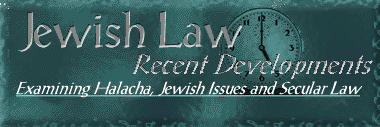

Jewish Law
Recent Developments
Rabbis Can't Be Sued For Revealing Congregant's Confidences
Refusing to Interfere with Acts of Religious Conscience, New York's Highest Court Dismisses Lawsuit
[Agudath Israel press release. For further information contact: Rabbi Avi Shafran (212) 797-9000 ext. 303]
ALBANY, NY -- In a unanimous decision, the highest court in New York State ruled on November 27, 2001 that members of the clergy cannot be held legally liable for the disclosure of confidential communications made to them by their congregants.
The Court of Appeals dismissed a lawsuit brought against two prominent rabbis in the Lawrence/Far Rockaway community by a congregant who claimed they had revealed information she had given them in confidence. The rabbis' attorneys, supported by a "friend of the court" brief written by noted Washington attorney Nathan Lewin and submitted by the National Jewish Commission of Law and Public Affairs (COLPA) on behalf of several Orthodox Jewish organizations including Agudath Israel of America, had argued that the rabbis considered themselves obligated by Jewish religious law to disclose the information, and that secular courts are prevented by the U.S. Constitution from involvement in matters of religious law.
The case, which grew out of a marital dispute, involved the wife's disclosures to the two rabbis that she was no longer observing certain basic practices of Jewish family law. In such circumstances, each determined that Jewish law obligated him to inform her husband, as well as the court considering issues involving custody of the couple's children.
The woman then filed suit against the rabbis, alleging that they had violated their duty to keep silent under the New York State's "clergy-penitent privilege." The rabbis countered that the "clergy-penitent privilege" was enacted only to protect members of the clergy from being forced to reveal, in court, confidential information relayed to them by their congregants, and does not grant individuals the right to sue members of the clergy. They further argued that they had been religiously required to make their disclosures, and that their actions were thus protected as a matter of freedom of religion.
Initially, a lower court ruled that members of the clergy could indeed be sued for violating their congregant's confidences. That court went so far as to conclude that the rabbis' defense - that they had been religiously obligated to disclose the information - was "wrong" and "outrageous" as a matter of religious law.
When the lower court handed down its ruling, the Conference of Synagogue Rabbonim of Agudath Israel issued a statement attacking the ruling as "troubling and dangerous." In the words of Rabbi Dovid Kviat, chairman of the Conference: "To tell rabbis that they risk civil liability if they follow the dictates of halacha [Jewish religious law] in the extraordinary situation when they conclude that Jewish law mandates disclosure of confidential information is to undermine an essential component of the rabbinical function."
The case proceeded all the way to the Court of Appeals, New York's highest court. Agudath Israel of America and the other Jewish organizations participating in the COLPA brief argued that the ultimate effect of a ruling against the rabbis would chill all communications between a rabbi and his congregants, out of fear of civil liability. It further made the point that secular courts cannot and should not rule on issues of religious law - in this case, whether the rabbis were correct in determining that as a matter of Jewish law they were obligated to reveal the information provided them.
The Court of Appeals, in its ruling, agreed: "The prospect of conducting a trial to determine whether a cleric's disclosure is in accord with religious tenets has troubling constitutional implications." Citing past precedents, the court ruled that "civil courts are forbidden from interfering in or determining religious disputes," and concluded as a matter of law that the "clergy-penitent privilege" does not provide a legal basis for suing members of the clergy for violating their confidences.
Agudath Israel attorneys David Zwiebel and Mordechai Biser, who were "of counsel" to the COLPA brief, praised the Court of Appeals ruling as "a landmark victory for the cause of religious liberty."
"Rabbis can now continue to properly counsel those in need," the Agudath Israel attorneys asserted, "and make such limited disclosures as mandated by halacha, without fear of being sued in secular court by a disgruntled congregant."

DISCLAIMER